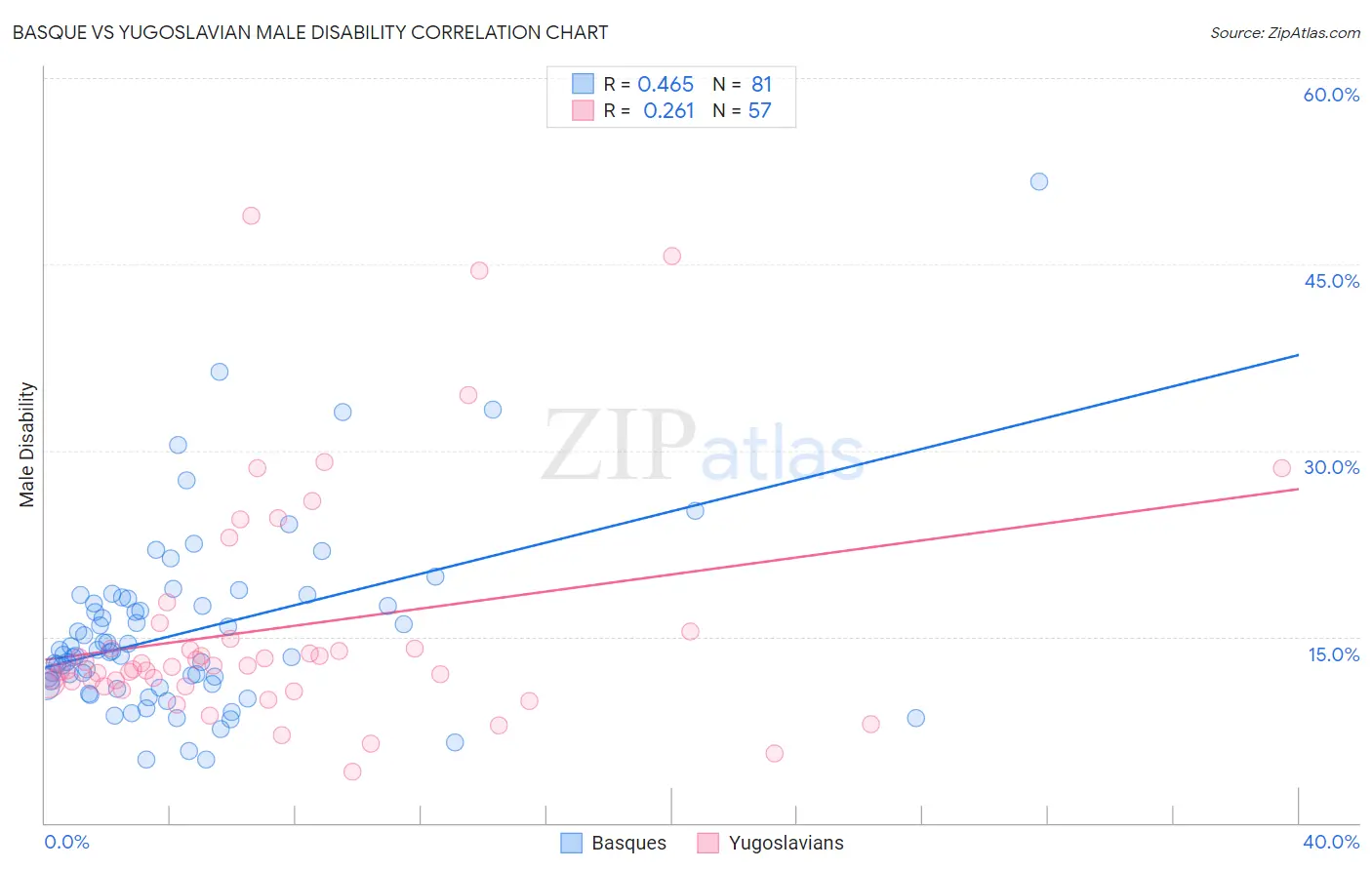Basque vs Yugoslavian Male Disability
COMPARE
Basque
Yugoslavian
Male Disability
Male Disability Comparison
Basques
Yugoslavians
12.1%
MALE DISABILITY
0.3/ 100
METRIC RATING
258th/ 347
METRIC RANK
11.9%
MALE DISABILITY
1.2/ 100
METRIC RATING
238th/ 347
METRIC RANK
Basque vs Yugoslavian Male Disability Correlation Chart
The statistical analysis conducted on geographies consisting of 165,777,747 people shows a moderate positive correlation between the proportion of Basques and percentage of males with a disability in the United States with a correlation coefficient (R) of 0.465 and weighted average of 12.1%. Similarly, the statistical analysis conducted on geographies consisting of 285,684,891 people shows a weak positive correlation between the proportion of Yugoslavians and percentage of males with a disability in the United States with a correlation coefficient (R) of 0.261 and weighted average of 11.9%, a difference of 1.8%.

Male Disability Correlation Summary
| Measurement | Basque | Yugoslavian |
| Minimum | 5.1% | 4.2% |
| Maximum | 51.7% | 48.9% |
| Range | 46.6% | 44.8% |
| Mean | 15.4% | 15.7% |
| Median | 13.8% | 12.6% |
| Interquartile 25% (IQ1) | 11.1% | 11.2% |
| Interquartile 75% (IQ3) | 17.9% | 15.1% |
| Interquartile Range (IQR) | 6.7% | 3.9% |
| Standard Deviation (Sample) | 7.4% | 9.5% |
| Standard Deviation (Population) | 7.3% | 9.4% |
Demographics Similar to Basques and Yugoslavians by Male Disability
In terms of male disability, the demographic groups most similar to Basques are Swiss (12.1%, a difference of 0.19%), European (12.1%, a difference of 0.19%), Chinese (12.1%, a difference of 0.44%), British (12.1%, a difference of 0.46%), and Slovene (12.0%, a difference of 0.64%). Similarly, the demographic groups most similar to Yugoslavians are Italian (11.9%, a difference of 0.050%), Czech (11.9%, a difference of 0.10%), Bahamian (11.9%, a difference of 0.14%), Northern European (11.9%, a difference of 0.15%), and Samoan (11.9%, a difference of 0.18%).
| Demographics | Rating | Rank | Male Disability |
| Yugoslavians | 1.2 /100 | #238 | Tragic 11.9% |
| Italians | 1.2 /100 | #239 | Tragic 11.9% |
| Czechs | 1.1 /100 | #240 | Tragic 11.9% |
| Bahamians | 1.1 /100 | #241 | Tragic 11.9% |
| Northern Europeans | 1.1 /100 | #242 | Tragic 11.9% |
| Samoans | 1.1 /100 | #243 | Tragic 11.9% |
| Immigrants | Laos | 1.0 /100 | #244 | Tragic 11.9% |
| Immigrants | Liberia | 1.0 /100 | #245 | Tragic 11.9% |
| Danes | 0.9 /100 | #246 | Tragic 11.9% |
| Hungarians | 0.8 /100 | #247 | Tragic 12.0% |
| Poles | 0.7 /100 | #248 | Tragic 12.0% |
| Immigrants | Yemen | 0.5 /100 | #249 | Tragic 12.0% |
| Bangladeshis | 0.5 /100 | #250 | Tragic 12.0% |
| German Russians | 0.5 /100 | #251 | Tragic 12.0% |
| Slovenes | 0.5 /100 | #252 | Tragic 12.0% |
| Guamanians/Chamorros | 0.5 /100 | #253 | Tragic 12.0% |
| British | 0.4 /100 | #254 | Tragic 12.1% |
| Chinese | 0.4 /100 | #255 | Tragic 12.1% |
| Swiss | 0.3 /100 | #256 | Tragic 12.1% |
| Europeans | 0.3 /100 | #257 | Tragic 12.1% |
| Basques | 0.3 /100 | #258 | Tragic 12.1% |